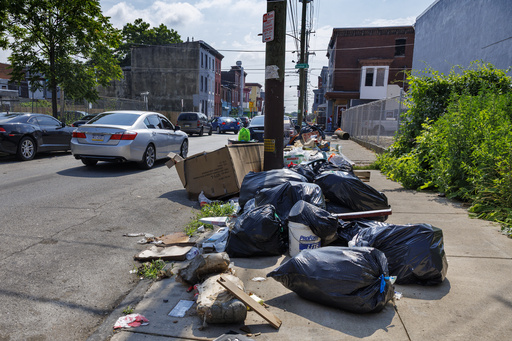PHILADELPHIA — On Tuesday, around 10,000 blue-collar employees from various city departments initiated a strike, displaying protest signs near Philadelphia City Hall and forming picket lines across multiple workplaces, including libraries and government offices. The strike, orchestrated by District Council 33 of the American Federation of State, County, and Municipal Employees, was primarily aimed at achieving better pay and benefits. News about the strike was shared on their Facebook page early that morning.
Mayor Cherelle Parker addressed the situation by announcing that several city services would face temporary suspensions or reduced operations. While residential trash collection would be paused, some city pools closed, and recreation center hours shortened, city officials assured that essential services would continue. Police and firefighters remain on duty, although many other vital roles, such as 911 dispatchers, sanitation workers, and water department personnel, are part of the striking cohort.
Amid the labor actions, three librarians visiting from Knoxville, Tennessee, were greeted with closed gates at the Free Library of Philadelphia. The unexpected closure because of the strike provided them an opportunity to engage with the protesting employees, expressing solidarity. Dhafir Gerald, a 48-year-old library security guard, encapsulated the collective sentiment, emphasizing the struggle for fair wages in light of rising living costs. With six years of service and a current salary of about $46,000, Gerald advocated for recognizing city workers as crucial pillars of Philadelphia’s infrastructure.
Despite the disruption, Mayor Parker reassured the public that Fourth of July celebrations would proceed uninterrupted, encouraging residents to maintain their holiday plans within the city. This announcement followed prolonged negotiations on Monday, after which the mayor confirmed that the city had extended its most competitive contract proposal. This included a proposed salary increase of 13% over Parker’s four-year tenure, factoring in the 5% raise granted the previous year and adding a new pay step to harmonize with other city labor unions.
Philadelphia remains committed to striking a fair yet financially responsible deal with its municipal workers, Parker conveyed, expressing a desire to resume discussions with the union. Meanwhile, city officials encouraged patience from residents contacting emergency and nonemergency lines, ensuring continued availability and opening designated sites for trash drop-off.
As the largest union of its kind in the city, District Council 33 seeks significant reforms, proposing annual salary hikes of 8% for three years, additional cost-of-living adjustments, and pandemic-related bonuses up to $5,000. Furthermore, they demand the city cover the full health care costs of $1,700 monthly per employee.
The city’s transit system managed to avert a broader strike last November by agreeing to a single-year contract involving 5% salary raises. However, memories of the prolonged trash strike in the summer of 1986, which resulted in weeks without garbage collection, continue to echo in local consciousness.
Center City resident Nick Shuhan expressed support for the city workers, underscoring the broader significance of advocating for livable wages and the enduring power of protest within the democratic fabric of the United States.


